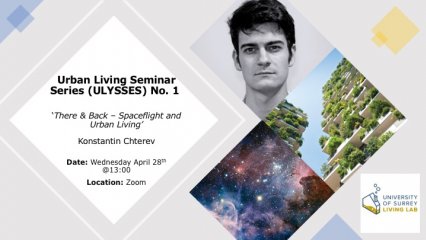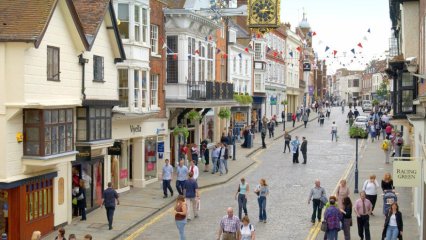

Events
Upcoming events based around urban living.
Upcoming events
We don’t currently have any upcoming events. Check back soon for further announcements.
Past events
Urban Living Seminar Series (ULYSSES)
If you are interested in viewing the seminar recordings, please contact Chris Jones at c.r.jones@surrey.ac.uk for the link(s).

When: Wednesday 28th April @ 13:00-14:00
Speaker: Konstantin Chterev (PGR, School of Psychology)
Recent developments in space are pushing the field further than before, but the industry struggles to adequately promote its interdisciplinary benefits. Space assists many endeavours on the ground, including healthcare, climate change, disaster relief, and public infrastructure. It also provides a rich platform for international cooperation and a variety of academic fields in contributing towards the UN Sustainable Development Goals, varying from engineering, law, business, sciences and humanities. As a psychologist, my work looks into human performance in extreme environments on Earth and in space, as well as applications in our everyday lives. I will present a brief overview of how space influences urban living, then discuss how the psychology of extreme environments links with life closer to home.

When: Wednesday 26th May 13:00-14:00
Speakers: Prof. Xavier Font & Dr. Pablo Pereira Doel
An innovative, smart device that provides real-time feedback during showers substantially reduces shower length. Randomised and covert field experiments led to a 14% reduction in shower time in tourism accommodations (where guests are not financially constrained by water and energy costs), and up to 27% when persuasive messages were added. That meant savings of about US$48, 4.44 m3 of water, 0.19 MWh of energy, and 33 kg of CO2 per room/year. Since we could not measure the effect of the intervention over time, we have installed 92 devices in the University of Surrey’s halls of residence to foster shorter showers among students. Students take longer showers (around 12 minutes) than the general UK population (6-7 minutes). In this seminar we will present the experiments developed in tourism accommodations and the preliminary findings from the halls of residence and seek collaborations with colleagues across the university to conduct further experiments in households and other contexts.

When: Wednesday 23rd June 13:00-14:00
Bicycle Sharing Schemes (BSS) are re-emerging as promising components of urban mobility solutions worldwide, particularly in the aftermath of the pandemic. However, the lack of consistent collaboration strategies between different actors and institutions, which have been tested in a wide range of cities and contexts regarding their design, tender, operation and expansion, raises significant implications for businesses and local authorities.
By employing a Multi-Level Perspective (MLP) framework and by introducing alluvial diagrams and circular dendrograms to BSS planning through a mixed-methods approach, this presentation illustrates an innovative tool in managing BSS, which may be particularly helpful in areas with limited funding and cycling infrastructure. Visualising bicycle ride flows in such a manner, particularly in near-live time, may offer valuable insight for fleet managers and local authorities about the operational challenges of BSS. Findings of the cross-sectional survey in Santiago de Chile confirm that maintenance and user support are significant for satisfaction levels, aside the anticipated factors i.e. cost and reliability. Furthermore, decisions regarding BSS expansion and modification could be based on such analysis and diagrams due to the precise identification of both the busiest and those under-represented BSS stations based on revealed preferences.
This presentation is based on the recently published JTG article: Saud, V. and Thomopoulos, N. (2021).

When: July 28th 2021
Speaker: Prof. Ravi Silva (Advanced Technology Institute and Head of Nano-Electronics)
Within the talk I will discuss how new plastic electronics being developed is helping to create new autonomous sensors and electronics that enable not just the visualisation of a future IoT but also the monitoring of our environment for a safer and more sustainable future. Much of the sensing needs to start with unobtrusive and unobstructive tech, that can help build virtual environments that can potentially be analysed using advanced technologies including AI bots. The output of these devices can then be used to map and help navigate optimised processes which help create a more sustainable world. Examples of a newly set up programme of work in Gujarat, India where some of the tech can be demonstrated in a fully developed ‘living-lab’ environment will be discussed.

When: Wednesday 23rd June @13:00-14:00
Speaker:: Dr Alex Hagen-Zanker (Reader in Infrastructure Systems)
This seminar will present recent work on the changing relationship between urban and rural areas and the emergence of peri-urban areas. Urban and rural areas have always had strong interdependence, but the nature of this is changing and the distinction between rural and urban is becoming more diffuse. It is increasingly recognized that the benefits that rural or natural land conveys to people can be highly valuable in urban areas too. Nature Based Solutions within urban areas can alleviate urban environmental and social problems, ranging from air and water quality, flood risk, noise, biodiversity, heat, car dependency, access to green space and beyond. The prospect of achieving co-benefits is alluring, but these benefits are realized through distinct pathways and across spatial scales and therefore present a complex balancing act. While, the rural is brought into urban areas, the processes of urbanization increasingly invade the rural areas to form peri-urban areas. Results from a study across European towns and cities provide evidence of a step-change in urbanization processes that is diffuse in nature and strongly at odds with the processes that have historically shaped urban settlement patterns. Finally, the seminar will reflect on the future of the urban-rural landscape in light of these ongoing trends.
Hutchins, M.G., Fletcher, D., Hagen-Zanker, A., Jia, H., Jones, L., Li, H., Loiselle, S., Miller, J., Reis, S., Seifert-Dähnn, I., Wilde, V., Xu, X.J., Yang, D., Yu, J., and Yu, S., 2021. Why scale is vital to plan optimal nature-based solutions for resilient cities. Environmental Research Letters, 16(4), p.044008.
Yu, J., Hagen-Zanker, A., Santitissadeekorn, N. and Hughes, S., 2021. Calibration of cellular automata urban growth models from urban genesis onwards-a novel application of Markov chain Monte Carlo approximate Bayesian computation. Computers, environment and urban systems, 90, p.101689.

When: Wednesday 8th December @13:00-14:00 (new date)
Speaker: Prof. David Frohlich (Digital World Research Centre, University of Surrey)
Debate about a paperless society has continued for well over 20 years now, but has never become a reality. One of the assumptions behind the case for moving from paper to screen reading is that this will reduce paper consumption to the benefit of the environment. But is this true? In this talk I consider this question in relation to a ‘next generation paper’ we have been pioneering at Surrey which connects it with the web. This leads to a paper-and-screen reading experience which fits with current transmedia reading practices and opens up a new chapter of the paper debate. I show that augmented paper could be a sustainable new technology if sufficient attention is given now to various design choices in its making; allowing us to enjoy the beauty and benefits of paper for many years to come.
David Frohlich is Director of Digital World Research Centre at the University of Surrey and Professor of Interaction Design. He joined the Centre in January 2005 to establish a new research agenda on new media innovation with social and cultural benefit. Prior to joining Digital World, David worked for 14 years as a senior research scientist at HP Labs, conducting design research on the future of mobile, domestic and photographic technology.
He has a PhD in psychology from the University of Sheffield and post-doctoral training in Conversation Analysis from the University of York. He has also held visiting positions at the Royal College of Art, and the Universities of York, Manchester, Sydney (UTS) and Melbourne, and is currently Visiting Researcher in the Department of Gerontology, Federal University of São Carlos, Brazil. He is also founding editor of the international journal Personal and Ubiquitous Computing.

WHEN: Wednesday 26th January @16:00 – 17:00
WHO: Dr Daniel Iacofano (MIG Inc., USA)
Daniel’s presentation will be based on his book, Streets Reconsidered, which he co-authored with Mukul Malhotra, both of whom are Principals with the urban planning and design firm MIG, Inc., of Berkeley, California, USA. The book presents a fundamental rethinking of streets, pushing beyond current thinking to answer: What can streets offer communities if they are designed for living and not just driving? Cities can reinvent how they utilize public streets. Beyond mobility, streets can be designed to support social gathering and celebrations, commerce, community play, growing food, generating electric power and much more.
With case studies from around the world, design guidelines and best practices, this talk will be of interest to anyone who shares a passion for designing great urban, human spaces.
Daniel will also present findings and results from his firm’s work on the Vision Zero Social Marketing Campaign for Downtown San Francisco, California, USA. Vision Zero San Francisco is part of a worldwide effort to reduce and/or eliminate traffic fatalities due to pedestrian and bicyclist collisions with fast moving motorized vehicles. Studies have shown that when speed limits are reduced, pedestrian fatalities decrease. The Vision Zero Campaign for San Francisco demonstrates how applied social science research can be used to modify dangerous driver behaviours, resulting in safer streets and fewer fatalities and injuries.
Daniel S. Iacofano, Ph.D., FAICP, FASLA (Founding Principal, President and CEO, MIG, Inc.) is internationally recognized as an innovator and thought leader in urban planning and design, strategic planning, organizational development, facilitation, and consensus building. His career is as multifaceted as the field he chose to pursue and the firm he helped co-found. From policy- and place-making to systems and structures, Daniel has worked with hundreds of communities and organizations around the world to think strategically and critically about achieving desired change.
MIG Inc. is a multi-disciplinary firm dedicated to the design of organizations, environments, and tools for human development. MIG looks at problems from a holistic perspective, applying theories, methods, and concepts from the ecological and social sciences in support of environmental and social change (www.migcom.com)